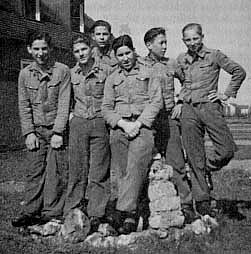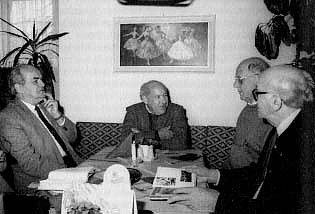Summary (back
to top)
Solomon Perelís amazing story is retold in both a book, Europa Europa
- originally in French, and the movie Europa Europa. Perel is born
on April 21, 1925. A Jewish boy growing up in Germany (in Peine, near
Hanover), his family realized it was not safe when Hitler came to power.
When Perel was ten they went to Poland, Lodz, where they think they will
be safer. Poland falls as well however and Perelís parents decide to send
Perel, who is fourteen, and his older brother Isaac, to safety on the
Soviet side. Perel and Isaac get separated on the crossing of the river.
But they end up finding each other and continue on to a Jewish organization
for refugees where they send Perel to a Soviet orphanage in Grodno to
keep him safe. His brother leaves him to continue on.
This next section marks Perelís time in the orphanage with the Russians.
He lives as close to a normal life as he can for two years. Perel does
not have to hide his Jewish identity here or any of his background. He
gets into the Komsomol, the Communist youth organization, since the orphanage
is Communist. Perel writes to his parents and receives letters while here.
All of his family is still alive so far.
Then, Hitler comes to Poland and the orphanage is evacuated. In the
confusion Perel gets separated and is found by some Germans. He makes
a choice and decides to bury his papers so there is no proof of his Jewish
identity. Since he speaks perfect German he tells them he is an ethnic
German. This saves his life and they take him out of line. Perel says
the Russians killed his parents and forced him into the orphanage. He
changes his name to Josef Perjell and becomes the translator for the German
Wehrmacht unit that is fighting on the front line. He has to hide his
identity completely, but one soldier who tries to make advances on him
finds out that he is circumcised but promises not to tell. This soldier
ends up dying in battle meanwhile Josef proves himself to be a "good
German" and they decide to send him to Germany to go to school.
At school it is even harder to hide his Jewish identity. He cannot
get too physical with Leni, a girl he likes, or she will find out that
he is Jewish. Leniís mother figures out that he is not German, but he
spills to her that he is Jewish and she also keeps his secret. Perel successfully
pretends to be a German for four years. When the war is finally over he
tries to find his family but only his brothers David and Isaac have survived.
Perel decides to go to Israel and finally arrives there in 1948 and lives
there even now.
While the movie is very close to the book, there were some
slight differences. In the movie Perelís sister dies before he goes to
the orphanage instead of during the Death March. When he is in the German
army as a translator he tries to go to the Russian side but ends up showing
the Germans where the Russians are and becomes a big hero. The love story
between him and Leni is pushed more and she ends up becoming pregnant
by his roommate in the film, which is not true in life. The ending has
him go over to the Russians where they do not believe he is Jewish. When
he is about to be shot by a Jew who was in the concentration camps, his
brother sees him and stops it just in time. The movie tries to capture
the essence of Perelís life but adds a few dramatic twists to the story
for emotional effect.
|
 Solomon Perel (center)
Solomon Perel (center)
 the
war, Perel moved to Israel. He became a soldier in the 68th
Regiment of the Jerusalem Division, led by Moshe Dayan (Perel, p. 213).
Now, Perel is a businessman and lives in Tel Aviv. Perel did not go back
to Germany until 1985. He was asked by the Mayor of Peine to be the guest
of honor "at the dedication ceremony of a memorial to commemorate
the destruction of the Peine synagogueÖas a Jew born in Peine who had
survived the Holocaust." (Perel, p. 69) Perel also still keeps in
contact with some of the men he knew from the Hitler Youth, (Katz, The
Ethnic News Watch) and they remember him and can vouch for his story.
He visited some of them on his visit to Germany in 1985.
the
war, Perel moved to Israel. He became a soldier in the 68th
Regiment of the Jerusalem Division, led by Moshe Dayan (Perel, p. 213).
Now, Perel is a businessman and lives in Tel Aviv. Perel did not go back
to Germany until 1985. He was asked by the Mayor of Peine to be the guest
of honor "at the dedication ceremony of a memorial to commemorate
the destruction of the Peine synagogueÖas a Jew born in Peine who had
survived the Holocaust." (Perel, p. 69) Perel also still keeps in
contact with some of the men he knew from the Hitler Youth, (Katz, The
Ethnic News Watch) and they remember him and can vouch for his story.
He visited some of them on his visit to Germany in 1985.